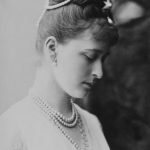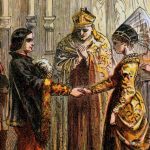 Despite being Empress of Russia from 1762 to 1796, Catherine was not Russian. She was a German princess, Sophia of Anhalt-Zerbst. She made a royal marriage of convenience in 1745 with the future Emperor Peter III. This prince seemed to be that usual lethal Russian cocktail of half-insanity mixed with extreme cruelty.
Despite being Empress of Russia from 1762 to 1796, Catherine was not Russian. She was a German princess, Sophia of Anhalt-Zerbst. She made a royal marriage of convenience in 1745 with the future Emperor Peter III. This prince seemed to be that usual lethal Russian cocktail of half-insanity mixed with extreme cruelty.
In 1762, only six months after he had succeeded as Emperor, Peter was murdered. As Catherine was proclaimed Empress by the soldiers who had formed his personal guard, historians have not found it difficult to attribute guilt for the assassination to Catherine herself. To judge by contemporary accounts and court diaries, it seems that the lady was well rid of her obnoxious husband.
Catherine ruled Russia for forty-four years. She was an intelligent, ambitious woman who corresponded with French philosopher and nuisance Voltaire. Amazingly for Russian royalty (even by marriage) she was considered a bit of a liberal, even enlightened.
But reign she did, and it was Catherine who produced the ill-judged and ill-fated Legislative Commission (1765 – 1774) which achieved precisely nothing; what is more, she created the Charter of 1785 which determined the eventual fate of the nobility by trying to establish the aristocrats as a privileged class, at the same time making the unwelcome onus of being a serf even worse by extending the period of serfdom, and making it harsher. The inevitable revolt (under Pugachev 1773, 74) was impossible to suppress.
Whether or not Catherine deserves the title ‘The Great’ is ripe for debate. Her foreign policy was mostly successful, and aided by Potemkin and Suvarov she got hold of most of Poland in the ‘partitions’ of 1772, 1793 and 1795. Poland has always been carved up and swallowed by more powerful states, only to recover sovereignty and territory after a painful period.
Catherine gained Azov for Russia in the First Turkish War, and annexed the Crimea, which stayed Russian until 1992, when independence was declared after the fall of the Soviet. The Ukraine, however, disagreed and imposed direct rule upon the Crimea.
By 1792 Catherine and her ministers had secured the whole northern shore of the Black Sea. She died at the age of sixty-seven.








Leave A Comment